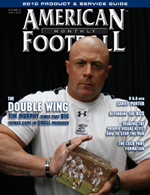AMERICAN FOOTBALL MONTHLY THE #1 RESOURCE FOR FOOTBALL COACHES
Article CategoriesAFM Magazine
|
From the Coach's Bookshelf - Brett Perkins' Frantic Francis© More from this issueDespite having a career record of 158-57-11 and being a member of the College Football Hall of Fame, Francis Schmidt is one of the most underappreciated college football coaches in the game’s history. An incredible offensive mind, Schmidt brought success to Tulsa, Arkansas, TCU and Ohio State during the 20’s and 30’s. He believed in a wild, wide-open, daring style of offense and created a playbook of more than 200 plays – unheard of at the time. His coaching lineage can be traced over the years to include Sid Gillman, Bill Walsh, and Mike Holmgren. But Schmidt was an eccentric character who alienated many of his players, the media, and members of the coaching fraternity with his paranoid, brusque and profane personality. Brett Perkins writes a detailed, anecdote-filled account of this mainly unknown coach who, in many w....The full article can only be seen by subscribers. Subscribe today!
|
|
|||||||
| HOME |
MAGAZINE |
SUBSCRIBE | ONLINE COLUMNISTS | COACHING VIDEOS |
Copyright 2025, AmericanFootballMonthly.com
All Rights Reserved





